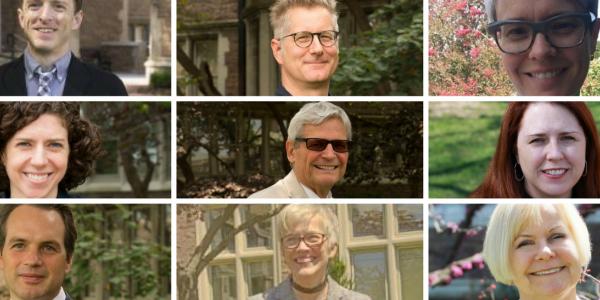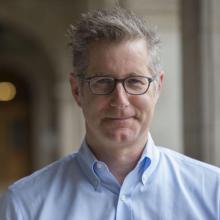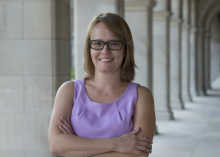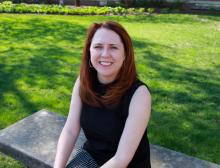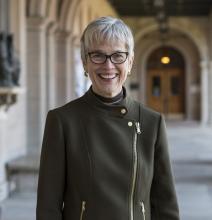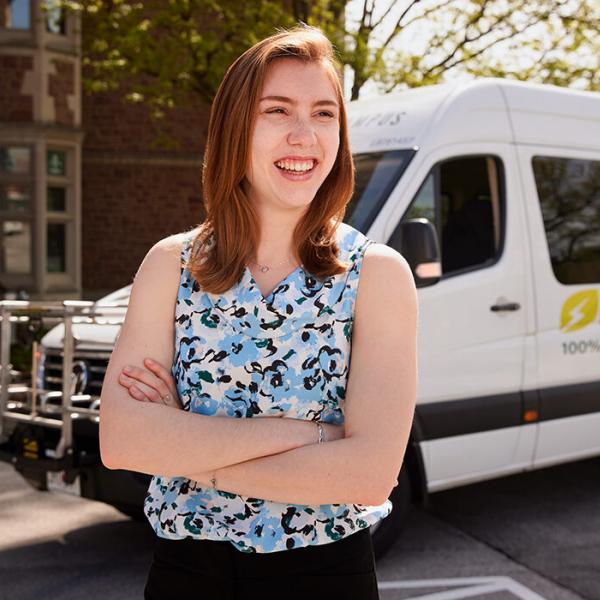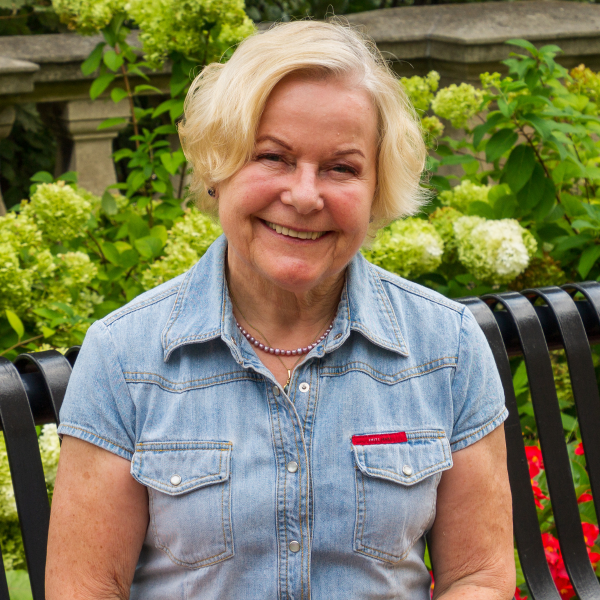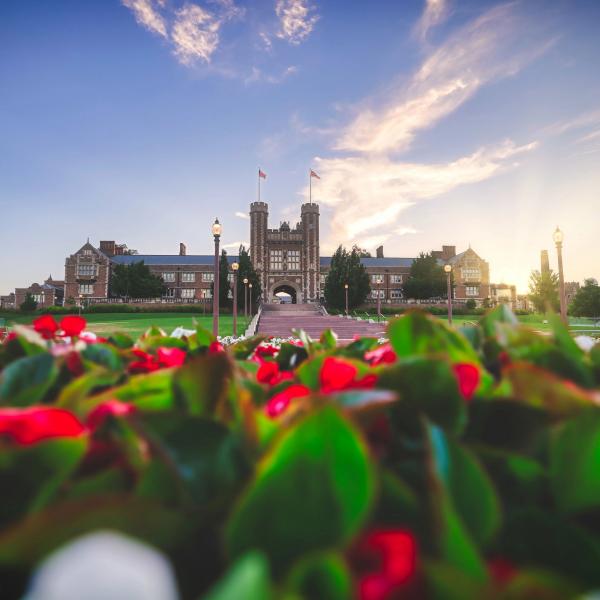The faculty update us on their 2017 activities.
Kurt Beals
I spent spring 2017 on sabbatical and am currently putting the finishing touches on my book manuscript, which bears the new working title Wireless Dada: Telegraphic Poetics in the Avant-Garde. I published an article on another aspect of the Dada movement – its relation to advertising – in the August 2017 issue of New German Critique. I also have an article forthcoming in the journal Configurations about later intersections of poetry and media technologies in the computer-generated poetry created in the 1960s by Max Bense and his collaborators. I presented this research on a panel at the 2017 GSA conference in October. Meanwhile, I’ve enjoyed getting back to teaching after a year away, and taught two courses this fall that were new to me: German Thought in the Modern Era (a survey from Kant to Habermas) and Fighting Fascism, a course I designed that covered various modes of resistance, critique, and opposition to National Socialism, ranging from the visual works of John Heartfield to the dramas of Bertolt Brecht, as well as opposition within Nazi Germany by figures such as Sophie Scholl and Dietrich Bonhoeffer.
Matt Erlin
Most of the big departmental events and news items are featured in this year's newsletter, so I will focus on my non-Chair related activities here. One of my teaching highlights was teaching a seminar on nineteenth-century German cultural nationalism this fall, as part of the Master of Liberal Arts program in University College. Although much of the material was familiar to me from other courses, teaching adults with a wide range of professional and educational backgrounds opened up all kinds of new perspectives on the topic. In terms of research, this was another year of exploring quantitative and computational approaches to cultural analysis, which, it turns out, are incredibly time consuming. My article on epistemology in the German and English novel finally (!) appeared in the Journal of Cultural Analytics, and Lynne Tatlock and I are putting the finishing touches on another article that investigates adolescent reading in Muncie, Indiana. Obviously this topic was a bit of a stretch for both of us, but the existence of an electronic database of all books borrowed between 1891 and 1902 was too good to pass up. Lynne first discovered the database while investigating American translations of German novels, so the project at least has German roots. A third ongoing project deals with intellectual networks in the German Enlightenment, and I was honored to be invited to deliver the Chandler Lecture at Bowdoin College on this research. In other news, a group of colleagues and I are in the process of organizing the first Humanities Summer Institute for high school students, a two-week series of lectures, workshops, and field trips designed for budding humanists. The topic for the first summer will be politics and the arts, and we have faculty members from German, Classics, French, Performing Arts, English, and Philosophy participating.
Jennifer Kapczynski
This has been a year of many diverse projects. I presented at GSA on a series of panels about art and resistance and joined a roundtable discussion on teaching in the age of authoritarian populism. I also completed my final term on the GSA executive board. I am actually going to miss those long meetings! In December, I had the great honor of seeing my first dissertation advisee, Simone Pfleger, defend her thesis. I also had the thrill of being interviewed about 1950s West German film culture for a piece on NPR about the first postwar German dubbing of Casablanca. On the publication front, I have a forthcoming piece on the avant-garde filmmaker Ella Bergmann-Michel, and am finalizing another essay about bodily postures and politics in West German filmmaking. I am also excited to be co-hosting the biennial symposium in April 2018, which will focus on “The Arts of Democratization: Styling Postwar Political Sensibilities in Postwar West Germany.” My co-organizer Caroline Kita and I are putting the finishing touches on the schedule, and we are already well into plans for the publication of the conference volume –– look for the finished product to appear sometime in early 2019!
Caroline Kita
This year I completed a book manuscript, Composing Compassion: German-Jewish Voices in Viennese Music and Biblical Drama, which has been accepted for publication with the German Jewish Cultures Series at Indiana University Press. I had the opportunity to teach two interdisciplinary courses related to this research, one at the graduate level, “Vienna 1900,” and another at the advanced undergraduate level, “What Dreams May Come: Explorations of the Psyche in Viennese Modernism.” In March 2016, a number of students from the Vienna graduate seminar joined me at the Austrian Studies Association Conference in Chicago to present papers based on their work in this class. As Director of the Summer Program in Göttingen for the fourth year, I developed our online application, revised our handbook, and prepared another energetic group of students to spend 8 weeks abroad. I am now working on a new book project on radio plays in Post-War West-Germany and Austria. With funding from the Center for the Humanities and the OeAD Franz Werfel Grant, I was able to spend the summer and fall semester of 2017 undertaking research at the Deutsches Rundfunkarchiv in Frankfurt and the Österreischische Mediathek and Literaturarchiv in Vienna. I was very pleased to be invited to give a lecture this December at the University of Graz on Ingeborg Bachmann’s radio drama, Ein Geschäft mit Träumen, and I am currently writing an article on this work. I am looking forward to an exciting spring semester as a Faculty Fellow at the Center for the Humanities and as co-organizer, with Jennifer Kapczynski, of the 24th Annual St. Louis Symposium on The Arts of Democratization: Styling Political Sensibilities in Post-War West Germany, which will take place in April 2018.
Paul Michael Lützeler
In 2017, I taught an International Studies course on the 1904 World’s Fair in St. Louis with an emphasis on the German and Austrian art exhibits. The students were advanced undergraduates from the Art History Department and the Art School, a wonderful group. Furthermore, I taught the 20th Century section in Ger340 (in English) for the first time, and I liked it. Several of my lectures both in Europe (conference at Utrecht University) and in the U.S. (Vanderbilt University) had to do with different aspects of the literary discourse on Europe. As president of the American Friends of Marbach, I organized the symposium “Transatlantic German Studies: Personal Experiences” at Washington University (September 15-16, 2017) in cooperation with the John M. Olin Library. During the fall term, I gave keynote addresses at three international conferences, the first one at the University of Erlangen on “Politics and Literature”, the second on “Autobiography” at the University of Krakow in Poland, and the third on “Inner Emigration” at the University of Lodz in Poland. On the publication side: As president of the Internationaler Arbeitskreis Hermann Broch, I co-edited the theme issue “Diagnosen der Moderne: Hermann Broch” as volume 4 of the “Yearbook for European-Jewish Literary Studies”, an article on the “Post-colonial gaze” in the “Handbuch Postkolonialismus und Literatur”, and an article on “Broch und die Neue Sachlichkeit” in a volume on “Medienkultur der Weimarer Republik.” As director of the Max Kade Center for Contemporary German Literature, I edited the 16th volume of the yearbook “Gegenwartsliteratur” with a focus on Daniel Kehlmann.
Erin McGlothlin
In terms of research, 2017 was an active year for me. I participated in a number of exciting in-depth research experiences, including a seminar at the American Comparative Literature Association on the representation of Holocaust perpetrators (which I organized with Gerd Bayer from the Universität Erlangen-Nürnberg) and a seminar at the German Studies Association on affect and cognition in Holocaust culture (which I organized with Agnes Mueller from the University of South Carolina and Katja Garloff from Reed College). I also gave papers at the Notre Dame German-Jewish Studies workshop, the Radcliffe Institute for Advanced Study Workshop “Humanities Education in the Narrative World,” and the conference of the International Society for the Study of Narrative (where I was presented with an Honorable Mention for the 2017 Phelan Prize for Best Article in Narrative for my 2016 article “Empathic Identification and the Mind of the Holocaust Perpetrator in Fiction: A Proposed Taxonomy of Response”). Further, I was invited to give lectures at Wagner College (for a special tribute to Elie Wiesel) and Northwestern University, and I gave the keynote lecture at the “Internationales Fred Wander Symposium: Biografie, Werk, Holocaust-Kanon” at the Universität Dortmund. Over the summer, I continued to work on my book project “Constructing the Mind of the Holocaust Perpetrator in Fictional and Documentary Discourse” and wrote a chapter entitled “Art Spiegelman’s Autobiographical Practice from Maus to MetaMaus,” which is forthcoming in The Cambridge History of the Graphic Novel. As 2017 comes to an end, I’m currently hard at work as co-chair of the biennial Lessons and Legacies of the Holocaust Conference (the largest international Holocaust Studies conference), which will be held at Washington University, November 1-4, 2018. In terms of departmental work, I continued in my position as Director of Graduate Studies, and in fall 2017 I took on the challenging but rewarding role of supervising the first-year language program.
Christian Schneider
2017 was an exciting and eventful year. Having returned from my one-semester sabbatical at the Freiburg Institute for Advanced Studies in early January, I flew back to Germany in March for the birth of our daughter, Sophie. If Sophie were able to remember the first few months of her life, one of her recollections would probably be her father walking her in a baby sling along the bank of the Rhine near Bonn, and telling her about principles of coherence in early Middle High German epics from the 12th century—thought splinters from the final chapters of my second book, Logiken des Erzählens, which I finished over the summer. I particularly enjoyed discussing parts of it with our graduate students in my graduate course on “The Art of Storytelling in Medieval German Literature” in the fall term. In August, Knowledge in Motion: Constructing Transcultural Experience in the Medieval and Early Modern Periods appeared as a special issue of the early modern studies journal, Daphnis. The volume reflects the proceedings of the biennial St. Louis Symposium on German Literature and Culture that Gerhild Williams and I organized in 2016. Meanwhile, Gerhild and I have embarked on our next conference project, the 8th International Frühe Neuzeit Interdisziplinär Conference (March 8-10, 2018), which will commemorate the 400th anniversary of the outbreak of the Thirty Years’ War. Toward the end of the year, Cecily and I, with great support from our infatigable student worker, Becky, put together my tenure dossier, and I also submitted Logiken des Erzählens as habilitation thesis to Heidelberg University. While I’m practicing myself in being patient, little Sophie makes sure that there is sufficient distraction along the road.
Lynne Tatlock
Just when I think I can’t be any busier, I have a year like the past one! I continue to perform the precarious juggling act of directing Comparative Literature while maintaining my commitments to the German Department, which remains my home at the university. The double duty has been salutary if intense. An exhilarating aspect of my work for Comparative Literature is regularly co-teaching “Literature in the Making” with the German writer Matthias Göritz. This course combines theory and practical criticism with the praxis of creative writing and translation. Our headiest moment each semester has been our students’ public reading of samples of work they created in the course. On the German side, I’ve maintained my research and teaching interests in the long nineteenth century and especially enjoyed teaching “Empire and its Discontents” this past semester. But even as I have pursued my several ongoing nineteenth-century projects, I have once again turned my attention to the seventeenth-century poet Catharina Regina von Greiffenberg. Participation in the conference “Transatlantic German Studies: Personal Experiences,” organized by Mike Lützeler, proved a challenging and especially rewarding experience: once I overcame my trepidation, I actually relished the exercise of making sense of what had never seemed to me a particularly coherent path. The perspectives of other participants, some of whom I knew only by reputation, provided a still broader basis for considering what has been lost and gained as our profession has evolved under many pressures and to draw some conclusions for the future. That experience complemented my yearlong service on an Arts & Sciences committee devoted to re-thinking graduate education especially with the idea of alternate outcomes for the PhD. It was a pleasure to support Mary Le Gierse in her defense of her dissertation in August and to direct the MA thesis of exchange student, Antonia Villinger. I am daily grateful for the collegial atmosphere in our department and our shared commitment to our students.
Gerhild Williams
Currently, and for the foreseeable future, I am working on a larger project about Ottoman Eurasia in Seventeenth Century German Literature. I have published several essays on this topic as I am moving forward. The volume of the 23rd Symposium on German Literature and Culture on the theme of Knowledge in Motion: Constructing Transcultural Experience in the Medieval and Early Modern Period (March 31-April 2, 2016) has appeared with DAPHNIS 45, 3-4 (2017). I contributed an essay on “Going Far: Movement and Knowledge in Early Modern Narratives (Busbecq, Speer, Happel)” to the volume. I presented a paper at the 16th Century Studies Conference, at Milwaukee (October 26-29, 2017) entitled “Crossing borders, bridging cultures: Speer’s Pseudo Simplicissimus on his way from Breslau to Kairo and back.” In August 2017, I participated in an international workshop entitled "Skokloster as a Laboratory of Early Modern Studies,” at the Skokloster Castle, Sweden, and at Stockholm University (August 14–18). Funded by Stockholm University (Illinois-Sweden Program for Educational and research Exchange, INSPIRE), Riksbankens Jubileumsfond, and The Royal Armory and Skokloster Castle with the Hallwyl Museum, researchers from different institutions and disciplines worked together with museum curators with the aim to start an interdisciplinary project at Skokloster that will make new knowledge available to the early modern research community and a larger public. Christian Schneider and I are busy organizing the 8th FNI (Frühe Neuzeit Interdisziplinär) Conference on the topic of Rethinking Europe:War and Peace in Early Modern German Lands March 8-10, 2018 at Washington University.
On the administrative side of my appointment I continue to be busy with accreditation, assessment, and other tasks “as assigned”.

